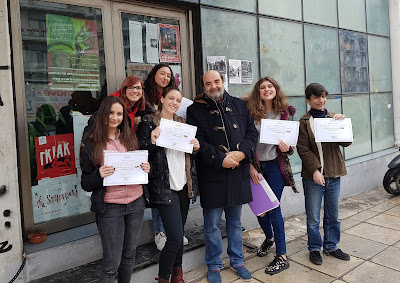On
Sunday the 19th of February, 6 of our school's students presented the project “Lessons for present lessons for
future” on the state's radio (102 fm). For 50 minutes the students talked about
the goals and the activities of the project as well as the experiences that
they gained through their participation. They also talked about the schools and
countries that they visited, the friends that they made and the hospitality
with which they greeted their European partners last February. Finally, they
emphasized that they would pursue participating again in an Erasmus project.
AIMS:
We are working on a set of European/International Lesson Plans about the consequences of the totalitarianism in the XX Century, in the WWII and in the Spanish Civil War, with emphasis on the Human Rights like the concentration camps during the Holocaust (Shoah) and the current consequences of the Spanish Civil War (Law of Historical Memory), and the resistance movement of people who thought other world and reality was possible. It means our main purpose is to make our students aware of the importance of critical thinking and political and social activism in the construction of the EU through the European History and the development of Human Rights against intolerance and totalitarianism in order to create pedagogical tools to offer a new perspective on the extermination: from Collaboration, Indifference and Resistance in response to the new rise of radical-right parties in Europe.
Monday, 27 February 2017
Wednesday, 15 February 2017
Students of Gimnazjum im. Jana Pawła II in Auschwitz-Birkenau State Museum
On 3rd February third year students of Gimnazjum im. Jana Pawła II in Sosnowiec visited Auschwitz-Birkenau State Museum in Oświęcim.
Photos by Tymoteusz Masarczyk
Sunday, 5 February 2017
Nour, a Syrian refugee talks to the students of Grade B, 28th Lyceum of Thessaloniki
On
Wednesday, 1st February the students of Grade B met and talked to
Nour, a Syrian refugee. 27-years-old Nour talked about what made him flee his country
and what hardships he went through to
reach Greece. He spoke about his home city, the devastated Aleppo, his family,
whom he lost during a bombarding, his parents, his sister and his girlfriend
whom he was about to marry to. He also spoke about his journey in the Greek
territory: from Mytileni where he arrived on a boat from the Turkish coast to Athens and then to Idomeni and finally to
Thessaloniki. There he works for a nongovernmental Organization as a translator helping his
fellow citizens.
Nour
recited his tragedy with no emotional strain. But in his eyes one could recognize
the deep pain of a man who lost everything and has nothing to keep him going. The
sincerity and directness of his talk captivated
the students who listened to him with attention and
were emotionally touched.
The
question seems plausible: What can we do to help those people?
And even
more What can we do to prevent wars from devastating cities and human lives?
Subscribe to:
Comments (Atom)










